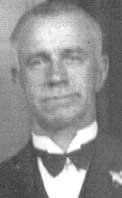William Carruthers Davidson

Memoir by his grandsons Dally Messenger III and
Ken J. Messenger (dated from July 3, 2002)
(Mainly from Joanne Egan on Wikitree: William was born in 1877 in Glasgow in Scotland. He was the son of George Davidson and Helen Lauder. William migrated to Australia with his parents in 1884 (he was seven years of age [his death certificate says he was 17 years of age]). He passed away on the 17th November, 1963 (aged 86) - he was then in an old people's home - The Bundeena Private Hospital. He is buried in the Presbyterian section of Woronora Cemetery).
He was married twice. The first in 1903 (aged 26) to Amy Earle. He had two children from his first marriage - Amy and Allan.
His second marriage, in 1913 when he was 36, was to Catherine Maude Doyle, our grandmother. There were four children of this marriage - Max, Dorothy (our mother), Joan and William (Bill))
He was not highly regarded by his family mainly because he got drunk every Saturday night and had autocratic ways.
(DM) But to me as a child aged 8 to 14 he was a decisive influence and one of the most wonderful people in my life. I was sent in my primary years - Grades 4 and 5 in a boarding school of exceptional catholic cruelty - Clairveaux, Katoomba, NSW, Australia, the Junior School of St Bernard's College. The most sadistic De La Salle Brother was Brother Malachi, who demanded that my grandfather, who had a bad leg, pick me up at weekends.
My grandfather would walk the four miles to the college to pick me up. He refused to catch the bus because of the money for the fares. When Bro Malachi saw him coming he would send me out to meet him. How I longed to get out of that place and how wonderful of the old man to walk all that way to make sure I got out.
He talked to me about the Great Depression, the Railways, The Unions, the Labor Party. He hated the capitalist classes. He would listen to Federal Parliament on the Radio and especially cheered on Eddie Ward, the member for East Sydney who socked it to the monied classes and never let up on how they oppressed the working classes.
He was an inveterate letter writer to the local paper. He became exceptionally abusive when the bus companies put up the price of the bus far from Leura to Katoomba (by a penny) or when the price of beer went up.
He was stone cold sober during the week. but on Saturdays (my brother Ken remembers Fridays) nothing could dissuade him from getting dressed up in suit, tie and hat, shined shoes and all — and going to the pub from whence he came home totally drunk. On the down hill path to the house he once fell over on his head and landed upside down - straigt as could be, his hat in the dirt and his feet in the air. My grandmother was shrieking in fear that he had injured himself, but he was perfectly all right and so drunk he had no idea he was upside down.
On these nights he would sit up until the early hours, talking out loud of his experiences during the Depression on the Railways, when the jobs were divided by four (i.e.he received a quarter of a wage). The average person was caught up in a desperate struggle for basic survival.
He had strong views on enterntainment. He loathed Bing Crosby ( a "Groaner") as representing everything which was decadent in modern youth. He ranted against the Andrew Sisters as "brazen hussies". Young women who flaunted thier attributes were vehemently condemned as "leaving nothing to the imagination".
He could not understand how anyone could enjoy such colourless singing, when they could have listened to Harry Lauder, Gladys Moncrieff, Gilbert and Sullivan or Dame Nelllie Melba. He lamented the decline of vaudeville, which re recollected as real fun and entertainment.
He would often sing:-
"Make the ship lighter, the Captain roared,
chuck some of the passengers overboard."
and similar ditties.
He was a teller of stories. He would describe the boa constrictor snake in fearsome detail. How it could drop from a tree, 30 feet long and a foot thick, wrap itself around a man and strangle him to death.
The Depression and the War (WWII) had also made him extremely thrifty. I used to love walking with him. One day I recall him picking up a piece of paling with an old nail in it. It went into the sugar bag he always carried with him. The wood was saved for the fire heap and the nail was carefully extracted, straightened out on the anvil with the hammer, dipped in sump oil and preserved in the appropriately sized jar.
This was the the late forties, Post Depression, post War. Nothing was ever thrown out.
